
Parker Johnson
August 18, 2016
Technology team works daily to keep programs running
In the digital age, information and mission-critical communications move fast. In the non-profit world, organizations like the Leadership Institute have gone almost entirely digital in our pivot to the information age and in doing so have greatly increased our ability to communicate with students, graduates, and donors across the nation.However, all of this decreased overhead and quick communication says little about the most integral part of a digital organization's vital asset: effective internal technical support.This past summer, I had the opportunity to intern with the Leadership Institute in the technology department. My biggest objective when coming to the Leadership Institute was to learn if my schooling thus far had prepared me professionally to work in a full-time position. Thanks to the incredibly welcoming and fun work environment, I now know for certain that I am ready to step into the career world when I graduate in May of 2017. During my internship, I was able to work on a variety of projects and touched on almost every facet our tech support team's responsibilities. The solid base education that I've garnered here has prepared me to step into a development role in the technology department at the Leadership Institute.As a member of the tech support team, I was also responsible for troubleshooting problems around the office. This allowed me to get out of the tech suite and introduce myself to the many talented and enthusiastic people working at the Leadership Institute. By helping with varied technological problems, I felt like a valued and useful member of the team.I am very grateful for the opportunity to work with the Leadership Institute this past summer. Not only has it further convinced me that the conservative movement is alive and well, but it has shown me that there are many opportunities to advance professionally with like-minded people. As a team, the technology and other departments can continue to work together for the advancement of our mission. Parker Johnson is a summer intern in the Techonology Department at the Leadership Institute. The Leadership Institute offers over 47 types of training programs, working with more than 1,619 conservative student groups, and helping employers connect with conservative job seekers. Since the Institute's 1979 founding, LI has trained more than 175,000 conservative activists, students, and leaders. Graduates include members of Congress, state legislators, local officials, media personalities, and conservative organization leaders. For more information, please visit www.LeadershipInstitute.org.>
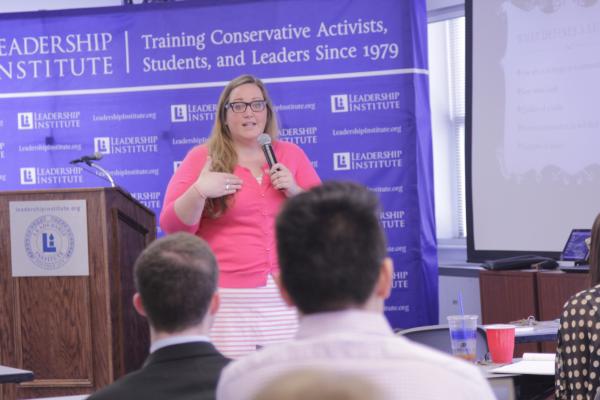
Patricia Simpson
July 26, 2016
Leading Without Authority
Most of us don't run an organization or company, we aren't calling the shots, and we certainly aren't signing the checks. But that doesn't mean we can't be leaders in our current positions. Here are some helpful tips to put you in a position to influence your peers, and even your supervisors.1. See yourself as a leader. If you don't have confidence in yourself or your abilities, you can't assume anyone else will. Whatever task you are assigned, become an expert in it. Confidence often comes when you feel knowledgeable, and when you're confident you command respect.2. Having a network means you're connected. A good manager appreciates when their subordinates have contacts that can help a project be successful. If you know someone at another organization or company who would provide a positive impact on the project you're working on, speak up and let your supervisor know. There's a good chance they'll listen.3. Don't present problems. Present solutions. If you find yourself hitting roadblocks when working on a project, figure out the best way to work around it. When you let your supervisor know about the problem, you should already have a solution. It shows responsibility, creativity, and innovation – and puts your ideas and actions in the driver's seat.4. Act like you've been there before. There is always going to be a scenario in which you've never found yourself before. If you take charge and tackle the problem head on without hesitation, individuals are much more likely to listen to you because you are the automatic “expert.”5. It's a game of pushing and pulling. Figure out how other people communicate. Some are influenced by being pulled into a situation through leading and involving while others are pushed through inquiring and proposing. Once you identify how an individual is influenced, you can adapt your approach to any individual to make them more likely to listen and follow you. Use these five tips to drive results wherever it is you're currently working. Peers will follow your lead and supervisors will notice the example you're setting for others. If you're driven and learn to read others, you don't need a title to be a true leader.Patricia Simpson is the Director of Career Programs at the Leadership Institute. In addition to overseeing the Division's trainings, like the Conservative Career Workshop, she manages all aspects of ConservativeJobs.com -- the Institute's free job placement service. >

Jami Averwater
July 19, 2016
Leadership Institute graduate uses training to play active role in the Republican National Convention
Joy Lee is a graduate of the Leadership Institute. She served as an attorney at the Committee on Arrangements for the 2016 Republican National Convention. Joy was born in Seoul, South Korea, and raised in Los Angeles, CA and Baltimore County, MD. Joy is a proud graduate of University of Maryland and Washington and Lee University School of Law.Read her interview about her experiences at the Leadership Institute and the Republican National Convention. 1. How did being a Leadership Institute (LI) graduate prepare you to work for the Legal Division at the Committee on Arrangements for the 2016 Republican National Convention (“COA”)? I attended the Leadership Institute's Women's Leadership Training in March 2014 in Arlington, Virginia with dozens of other women from around the country. Though this training did not prepare me for the legal and substantive parts of my role today, it provided me with a general framework as I started my career. Politics and the field of law are often considered to be male-dominated fields, so it's especially important for young women to learn how to present themselves as leaders wherever their careers take them.I was fortunate to be surrounded by and learn from some of the best legal, political, and logistics operatives in our party—many of whom are women. 2. How many months in advance does the COA begin to plan the Convention? I moved to Cleveland from Washington, DC for this position in late February/early March 2016, just under five months before the start of the Convention. At that point, the COA was already staffed to approximately fifty people, most of whom moved to Cleveland from various parts of the country.The first staff member of the COA was hired more than a year in advance of the Convention. At its peak, the COA had approximately 120 staffers, dozens of independent contractors and interns, and hundreds of volunteers. 3. Why was Cleveland chosen as the location for the 2016 Republican National Convention for the third time in history? The last time the Republican National Convention came to Cleveland was June 1936. Since then, the city of Cleveland has had its share of losses—economical and sports-related—but in recent years, Cleveland has experienced a resurgence. To showcase that on a national and even international level, the city of Cleveland submitted a bid to host not only the Republican National Convention but also the Democratic National Convention for three cycles in a row. When I asked a member of the Site Selection Committee why they chose Cleveland, he answered, “We felt special there.” Now that I've been in Cleveland for a few months, I can relate to that sentiment. The city of Cleveland has welcomed us with open arms, and it's evident how much this Convention means to the people of Cleveland. Especially in light of its recent NBA Championship—its first sports championship since 1964 and effectively earning its reputation as being a cursed sports city until now—there is a distinct buzz around town. It's exciting to be a part of history, not just for the party, but also for the city of Cleveland. >
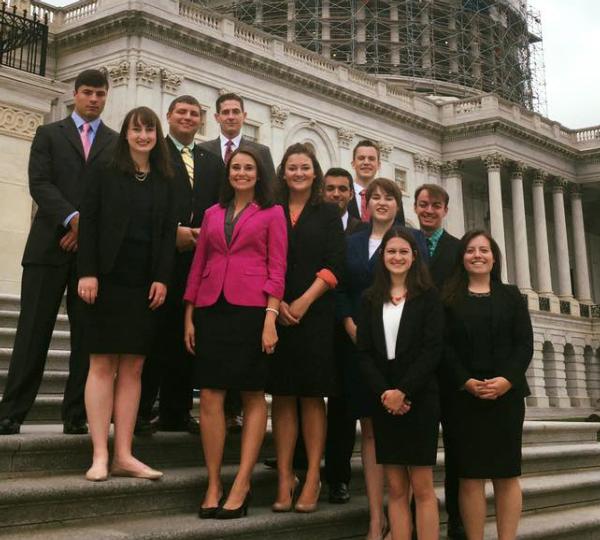
Jami Averwater
June 16, 2016
Leadership Institute welcomes summer 2016 intern class
The Leadership Institute recently welcomed the 98th intern class to Arlington, Virginia and I am personally very excited to be one of them. My intern class exhibits diversity in age, level of education, college major, and career aspirations, but we all share one important goal in common: we want to strengthen the conservative movement. Since our arrival, we have had the opportunity to get acclimated to the office and to the area by attending the annual staff retreat and participating in a competitive scavenger hunt through the city. During our time here at Leadership Institute, we will host conservative leaders for weekly private dinners, visit Members of Congress on Capitol Hill, and complete projects of high responsibility for our respective departments. There are thirteen of us interns for the summer semester, many of whom are residing in the Sacher House. The opportunity to reside in the house allows a convenient, safe place for us to stay during our time with the Leadership Institute and has proven to never allow for a dull moment.Kelsey Mix (Fairfax, Virginia) is an intern in the Career Services department and spent her first few weeks planning and promoting an upcoming workshop titled "Conservative Intern Workshop". A recent graduate from William & Mary, she hopes to use what she learns during the internship to land a job on the Hill. Kelsey says she enjoys living in the Sacher House and bonding with the other interns because they “are all passionate and involved in their communities and in the movement”.Elijah Montes, a sophomore in his home state of Louisiana, is interning for LI Studios. His most critical duties are to maintain, manage, and operate the equipment used to film the LI Webinars, maintain the headshots for the staff and interns, and assist in the daily operations of the studio crew.Ben Becker (Osseo, Wisconsin) recently completed his freshman year at Bob Jones University as a Business Administration major. Ben is excited to be working with David Blair in the Youth Leadership School program. His duties entail recruiting for the schools and ensuring that the days leading up to it go smoothly as possible. Ben says he enjoys living in the Sacher House with the other interns because he is expanding his network and learning more about the conservative movement from his new housemates. He is also excited to enjoy the benefits of convenient Leadership Institute trainings, such as the Intro to Campaign Data workshop.As a group of new friends, we spent Memorial Day weekend visiting Arlington Cemetery and preparing a delicious meal together. We also recently hosted our first speaker for dinner at the Sacher House and met with key leaders on the Hill to spread the word about the resources available at the Leadership Institute.As one of these passionate thirteen interns, I look forward to growing my network with this group. >
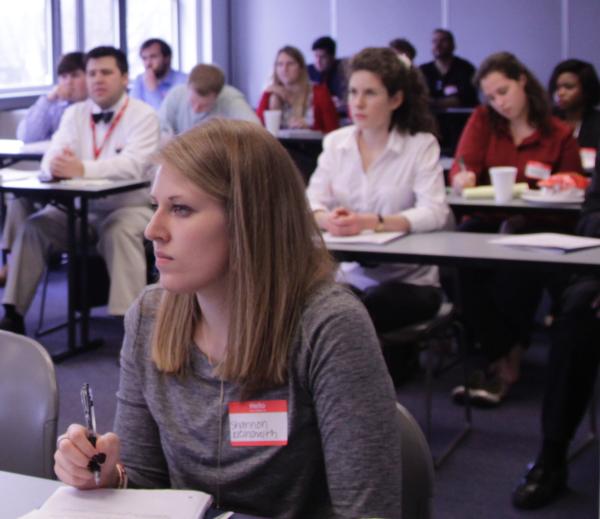
Elizabeth McCullough
June 13, 2016
Potential for Excellence
I recently stepped away from my desk and slipped downstairs into the LI Conservative Intern Workshop. Because who can resist the lure of free Chick-fil-a? Not I. Neither could 42 interns from various conservative organizations. Sessions started promptly, beginning with Patricia Simpson, LI Director of Career Services."Every single one of you have the potential for excellence." She paused.“You must think of yourself as a leader.” I haven't been an intern for 10 years, but I felt myself challenged to re-evaluate myself and my goals. “I wake up every morning and say to myself, ‘Let's be awesome today.”Meanwhile, out in the hall, Aynsley Harrison, Career Programs Manager, bled red ink over intern resumes. When she taught the incredibly practical Resume Workshop, I mentally tore up my previously loved resume.Later, a cheerfully honest session on ‘Personal Branding' brought to light the importance of intentional communication, “Make sure people remember you for the right reasons.”All LI trainings are free to every intern. Even if you're not an intern, discounts are often available. Do you strive for excellence? Are you prepared for leadership? Join us at one of the LI upcoming trainings for more ways to ‘be awesome' today. The next Conservative Intern Workshop is coming up next week. Chick-fil-a might even be on the menu. >
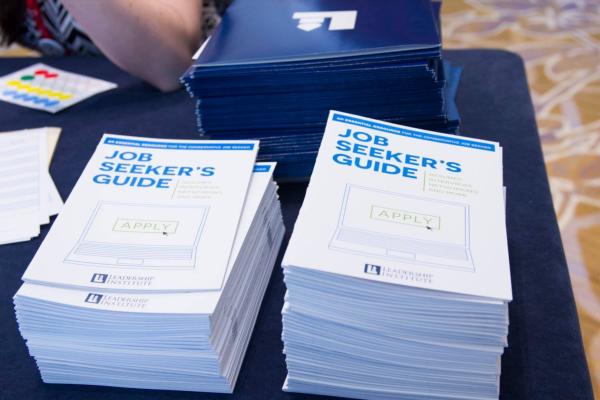
Patricia Simpson
June 1, 2016
Making Part Time Jobs Work for You
If you're like me, you have what my father jokingly refers to as, “champagne taste on a beer budget.” When I got to DC, my paltry entry-level staffer salary was not enough to sustain my lifestyle (which included “glamorous” things like paying rent and eating Lean Cuisines), so I did what any self-respecting 20-something had to do in that situation - I asked my parents for money! When they said no I did the next best thing – I got myself a part time job.Part time jobs in DC usually fit into one of three main categories – they pay well, they help your career along, or they're something that keeps you sane. Here are some tips on places to look for those jobs and the advantages of each one.They pay well – If you want a part time job that pays well, you're likely going to have to possess a highly technical skill or be willing to do some heavy lifting. There are plenty of folks who know how to do something, and most-likely do it well, but don't want to do it as a career. The benefit here is you can spend less time supplementing your income.Graphic DesignHTML codingMoving CompaniesThey help your career – Are you biding time at a non-profit and trying to figure out how to break into a Hill job? Go get a job as a bartender or wait staff at Cap Lounge or Bullfeathers. Do you want to get a job in the conservative or liberty movement? Go snag a job at O'Sullivans in Clarendon and request to work Tuesday nights. It is 100% possible to expand your network while getting paid and I highly recommend doing it. I know several people who got hired to a new position simply because they made a smart connection while working at a bar or being paid $20 to pass out stuffed mushrooms at a private fundraiser.Bars/restaurants frequented by industry employeesOrganizations and businesses needing extra help after hoursEvent staff for fundraisersPolitical call centersThey keep you sane – Sometimes making extra money should just be fun. I've worked at a store just to get an employee discount on merchandise and I've worked at a frozen custard shop because I wanted to meet nice people in a cool neighborhood. I have a friend who umpires Little League games. Stress-relieving jobs are like therapy sessions that pay you at the end.Your favorite retail store (DISCOUNTS!)Babysitting or dog-sittingUmpire/refereeAs fiscal conservatives we need to make sure we're practicing what we preach. The bottom line is if you need the extra cash, you can find a part time job that will benefit you. And if you don't need the money, sometimes a part time job can be a way to blow off steam, a way to meet new people, or your first step toward a new career.>
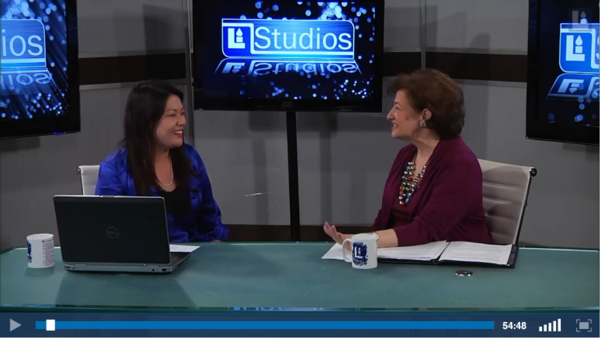
Elizabeth McCullough
April 25, 2016
What I learned at the TV Workshop
I confess that I wasn't too sure what I was getting myself into when I found myself in the front row of the Leadership Institute's monthly On-Camera TV training.All I knew was that if I'd known I would be on camera, I would have worn more makeup. Trying not to panic over my impending doom, I learned more about a few of my fellow students.As a busy mom, Christine Olson didn't have time to spend a day in the Studio. But then again, with an important TV interview looming, she knew couldn't afford not come. Despite having no hesitation speaking to large groups, her brain always froze in front of a camera.Even though it was Spring Break, Tristan Justice stayed in town for one of the limited seats in the highly sought after on-camera TV Training. As a college freshman, Tristan dedicates his time to conservatism activism and wants to be prepared as possible.That morning, at 8:50 am, conservative lawyer Aaron checked his email and saw there was an opening in the previously full TV training. “I had 20 minutes to rent a car.” He immediately drove 4 hours from New York City to the Sacher Multimedia Center in Arlington, VA and walked in right on time.You could feel the nervous energy in the air as guest faculty Beverly Hallberg smiled cheerfully behind the desk, almost as if the dreaded camera and microphone were her friends.Beverly has been on all sides of the camera. Producer, director, and host are just a few of the shoes she's filled. Before starting her own business, Beverly was also the Director of the Sacher Multimedia Center. Now she returns to teach uneasy yet eager students how to distil their message for TV.Under Beverly's encouraging instruction and honest feedback, I found myself thawing and even excited about my next turn in front of the camera.Everything she said mattered -- no filler information.Together we learned to ‘block' and ‘bridge' our message. As we fought through our camera fears, comradery and friendship replaced the jitters. The whole class cheered the next one to go ‘live.'By the end of the day, Christine was not only smiling at the camera but also at the top of the class.Aaron didn't dread the drive back to New York, “I knew it would be worth it -- and I wasn't disappointed.”My only regret was that it was over. And that I hadn't worn more makeup.Good thing the Leadership Institute hosts On-Camera TV Training every month -- I'll be in the front row again soon.>

Paul Van Remortel
April 19, 2016
Online Advocacy and Activism as a Tool for Action
In the digital era, videos that are really popular "go viral." This is true of online petitions as well - they spread quickly across social networks and a viral petition takes on a life of its own.For activists, this is a Godsend. Petitions have historically relied on word of mouth and community bonds to gain traction (and signatures). Today, it's easier than ever to rally thousands of individuals who share a given point of view and will show their support through signatures and sharing alike, substantially multiplying the impact.Unfortunately, the Left has dominated the medium through sites like Change.org, which has gathered more than 100 million users in support of primarily liberal causes. That success has fueled a myth that the tactic of online petitioning is one that only “progressives” can or want to use. But conservatives are increasingly realizing the benefits — and necessity — of incorporating online tools into modern activism efforts.Fortunately, anyone can become an effective advocate for any of the issues they care about with just a few simple steps.First, identify a cause you are passionate about — it doesn't have to be a national issue like Common Core or the Second Amendment. Sometimes the most powerful, effective petitions address local issues that others in your community care about as well.At StandUnited, an online platform we created to level the playing field for supporters of individual liberty, free enterprise, and limited government, individuals have created petitions that have had diverse impacts, from successfully requesting that Congress repeal the Medical Device Tax, to saving a historic Confederate War memorial in Portsmouth, Va.The next step is to identify the decision makers that will be able to effectively address the issue at hand. This could mean your local city council or the president of the United States — the beauty of digital activism is that anyone is easily accessible with your message.After identifying the decision makers for your issue, create and share a thoughtful, articulate petition with friends, family, neighbors and like-minded individuals. Nothing has made activism easier and more effective than social media, which is why it's so crucial that you share your petition on your social media profile to make sure as many people as possible see it. You might even be surprised by who agrees with you.Make sure that your local media is aware of your petition, and update them on the progress of the petition and the importance of your cause. This can be the most daunting part of the process, especially if you are not familiar with media outreach. Fortunately, most local media are interested in the issues that impact their city or state, and media coverage of your petition is one of the most effective ways to get the attention of decision makers.A great opportunity to get media coverage is to deliver your petition in person to the decision maker. If there is a deadline such as a vote, a hearing, or an election, use this opportunity to press the decision maker on your issue and get publicity.Finally, don't give up on your issue. Activism isn't a process that works immediately — sometimes it takes weeks or months for a petition to gain steam. Keep working to spread awareness of your petition and the issues at hand, and you're likely to see your hard work pay off.Thanks to the rise of digital activism, that sentiment is truer than it's ever been. Never have individual voices had a louder megaphone, higher platform or more direct access to decision makers, and as a result the power of the petition is greater than it's ever been. You have the power to make your voice heard.This piece was adapted from a recent Column on Townhall.com.Paul Van Remortel is the senior product manager at Intermarkets, Inc., a privately held digital media firm founded in 1997. Paul will be leading the “Online Advocacy and Activism as a Tool for Action” webinar hosted by the Leadership Institute on April 27. For a free registration visit https://www.leadershipinstitute.org/live/?ID=31958>
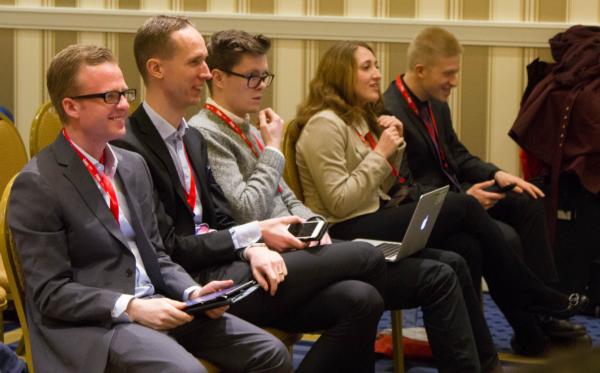
Natalie Tuttle
April 4, 2016
What You Missed at CPAC 2016
Each year, the Conservative Political Action Conference is a gathering of conservative leaders looking to network, advance conservativism, and learn from some of the greatest minds in the movement.This year, speakers like Dr. Ben Carson and Carly Fiorina rallied conservatives together. Above the stage read “Our time is NOW,” taken from Ronald Reagan's CPAC speech in 1981.At the conference, Leadership Institute sponsored, staffed, and organized of 5 conference events, including the job fair and boot camp training sessions.1. Activist Boot CampOn day one, the Leadership Institute partnered with the American Conservative Union and with American Majority to train 383 conservatives. Attendees were trained in student activism, community activism, and campaign technology.The Leadership Institute's Steve Sutton, David Blair, and Summer Ratcliff were among the boot camp faculty. Speakers from American Majority, Americans for Prosperity, FIRE, the Blaze, and the Franklin Center also trained activists and conservative leaders.2. ConservativeJobs.com - Career ConsultationsAfter the official CPAC kickoff on Thursday, Leadership Institute's Conservative Jobs organized recruiters from LI and other conservative organizations to critique CPAC attendee's resumes and offer one-on-one career consultations. Recruiters from LI, Cato, The Heritage Foundation, the Charles Koch Institute, and Americans for Prosperity sat down with 133 conservatives.3. CPAC Jobs and Internship FairOnce again this year, the Leadership Institute organized the CPAC Job and Internship Fair. Over 250 job seekers connected with 40 conservative employers.Organizations who recruited at the fair included grassroots organizations, media groups, think tanks, and policy foundations. Groups like Turning Point USA and Americans for Prosperity recruited field representatives while organizations like Townhall Media, Red Alert Politics, and Campus Reform looked for writers to hire.4. Campus ReformIn the exhibit hall, referred to by conference attendees as “the Hub,” Leadership's Institute's Campus Reform held an on-camera contest for students. Entrants were asked questions about issues on “live” camera by LI staff and competed for cash prizes.More than 100 students participated in the competition over the course of three days. All participants are eligible to be selected as Campus Correspondents, which will increase the number of conservative students exposing liberal bias on college campuses around the country.5. Young Activists Happy HourDuring CPAC, young activists from around the country network with each other. Swapping stories, discussing recruitment strategies, and just socializing with like-minded individuals are just a few highlights of the CPAC experience.To encourage networking among young conservative leaders, the Leadership Institute and seven other organizations hosted a Young Activist Happy Hour. Almost 400 attendees packed the bar and formed a line to the end of the block to spend the evening networking. Recruiters and staff of organizations like Young Americans for Liberty, Future Female Leaders, and the Charles Koch Institute mingled with activists.At the Happy Hour, the Leadership Institute welcomed many new activists to the Campus Leadership Program network. Almost aEvery year, CPAC is a new experience. Conservatives from all over the country (and from around the world) come together for a week of idea sharing, activist training, and coalition building. This year was no exception. With hundreds of new conservatives plugged in, trained, and employed conservative principles have a stronger voice going into election season.The Leadership Institute offers over 47 types of training programs, working with more than 1,759 conservative student groups, and helping employers connect with conservative jobseekers. Since the Institute's 1979 founding, LI has trained more than 172,000 conservative activists, students, and leaders. Graduates include members of Congress, state legislators, local officials, media personalities, and conservative organization leaders. For more information, please visit: www.LeadershipInstitute.org. >
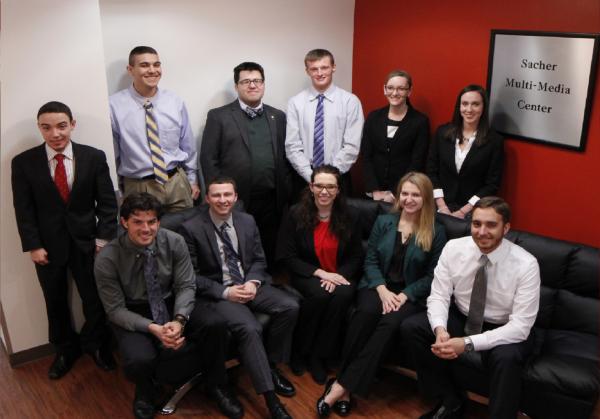
Derek Faraldo
March 31, 2016
The Conservative Internship Search: Capitol Hill vs. Non-profits
As a recent graduate of Georgetown University, I was blessed to have four years in the city of limitless internships, Washington D.C. However, not all students are lucky enough to attend college in the nation's capital. Fortunately, many universities have semester-long exchange programs, externships, or summer opportunities. During my undergraduate years, I participated in two non-profit internships and three congressional internships. If you do not have a few years to shop around for an internship then my experiences may help you narrow your search.Capitol HillI believe that in order to fully appreciate your time in Washington D.C. every intern should spend at least 12 weeks interning for a congressional or senate office.A congressional or senate internship can be a great resume booster, teach you some professional skills, and help you network on the Hill. Most interns are given simple office tasks to complete. While the work usually isn't anything inspiring, the experience of living in D.C. makes up for the sometimes boring days in a government office.For most prospective interns, there are some practical limitations. For example, in the year and a half I spent working for three different offices I did not get paid.If I had not had school housing, I would have been out of luck. There are some programs to help students pay for the cost of living in D.C, but it is an expensive city for a student on a budget.Non-profitsNon-profit internships are great starting points for careers in public policy, digital media, journalism, and many other fields. Each non-profit is different in office culture and atmosphere, but they generally operate in similar manners.For students or recent graduates who require monetary compensation and would like an internship with a job title and specific duties, the non-profit world is often a better option. In the conservative non-profit world, there are many paid internships that provide unique benefits.Often, these organizations hire from their own intern pool, so there is added incentive to make connections and maximize your efforts. The office environments vary, but at least you don't have to go through security every day!Most non-profits allow and encourage interns to work on projects that have value and many organizations treat interns like a staff member.A potential intern should really consider the kind of experience they want and set goals, always keeping in mind their practical limitations.Reflecting on my experiences, I would encourage students or graduates who lean conservative to seriously consider non-profit internships. Don't' worry, even while working at a non-profit, if you really want to see the Capitol building, you can visit your congressmen's office on your lunch break! One of his or her interns will give you a tour.Derek Faraldo is the current Grassroots and International Programs intern at the Leadership Institute. He recently graduated from Georgetown and will be working with Teach for America in the fall. Learn more about the LI Intern Program here.>
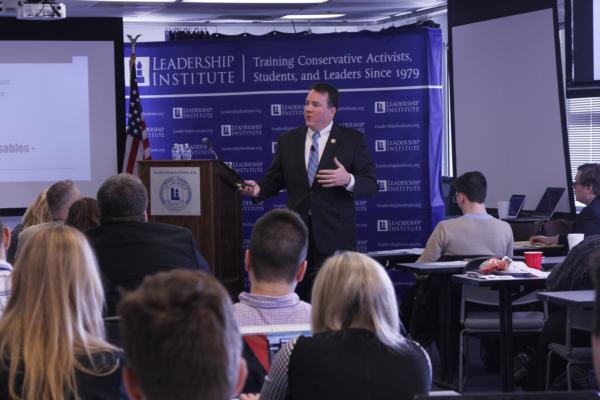
Natalie Tuttle
March 6, 2016
Future Candidate School: Training Conservatives to Win
If you knew the formula for winning, would you run for office?In January, thirty-four individuals attended the Leadership Institute's Future Candidate School. Some of them were declared candidates in their state or local races. Others were planning congressional runs and the remaining few had just begun to contemplate a run in the future.If you haven't considered running for office, you should. Running doesn't require thirty years of political experience or a few million dollar donors willing to sponsor you. With the right tools and training, anyone can learn to win at LI's Future Candidate School (FCS).For four days, attendees focus on building a base, raising funds, identifying voters, and recruiting volunteers. The faculty roster included political consultants, media coordinators, fundraising gurus, and even a current U.S. Congressman.The intensive training also focused on personal and political preparation for a career in elected office.Day 1: Are you ready to run?Because running for office means more than showing up to events with a smile and a wave, FCS started out with a session examining your ability to enter a race. George Landrith, president of Frontiers for Freedom, helped students examine their past and present, looking for signs of trouble. In the second session of the day, attendees learned that running for a higher office can be a full-time job with plenty of overtime and candidates have to be sure their finances are stable at home.To help candidates decide if running is right for them, Congressman Alex Mooney answered questions candidly about the role and responsibility of the candidate.The rest of the day focused on preparing your network and recruiting volunteers to your cause as well as making sure you have a positive media presence on the day you announce your candidacy.Day 2: So you decide to run. Now what?So now that our candidates have decided to run, they should develop a persuasive message. Leadership Institute Vice President of Development Steve Sutton worked through recent election messaging to demonstrate the impact proper use of messaging can have on a campaign. Nancy Bocskor reiterated the importance of messaging during her presentation on storytelling, emphasizing communicating effectively.In addition to crafting your message and sharing it with your voters, you also should reach out to existing groups and coalitions in your constituency. These coalitions may be able to provide volunteers and maybe even connect you with good candidates for campaign staff. Quality campaign staff do vital work to ensure your campaign is functioning efficiently and legally.Day 3: Getting in isn't even the hard part.Winning the race is the goal of every campaign, but what about staying in the race? You can't win the race if you can't pay your bills. Make sure you have the budget to remain a viable candidate.Competitive candidates have had to suspend their campaigns because they lacked the funds to keep the lights on. Don't be one of those candidates. Future Candidate School teaches candidates that their number one responsibility is fundraising. Staff and volunteers can get your name on the ballot and they can rally the voters, but only the candidate can raise money from donors. Day 4: Acting the part.On the final day of Future Candidate School, Dr. John Shosky, president of Roncalli Communications, Inc, spent the entire day with attendees, coaching each student through communication and messaging techniques. Beginning with introductions and ending with elevator speeches, students were led through a series of exercises to increase their confidence and improve their interpersonal skills. To be successful, candidates have to be versatile. Different situations call for different communication styles. Students were given tips on everything from posture to intonation. After drafting rough speeches, Dr. Shosky gave each student short critiques and advice to take away from the training. These guidelines are meant to improve the impression that a candidate will make in the first three seconds of meeting a potential volunteer, voter, or donor. Those thirty-four individuals walked away from the Leadership Institute's Future Candidate School with the formula to win. Will they run? Time will tell.To learn more about the Leadership Insititute or to sign up for a training go to LeadershipInstitute.org. >

Carol Wehe
February 26, 2016
CPAC 2016 Activism Boot Camp
American Majority and Leadership Institute are pleased to release the final agenda for the CPAC 2016 Activism Boot Camp, running Wednesday, March 2 – Friday, March 4, during the Conservative Political Action Conference in National Harbor, MD.On Wednesday, attend one of three tailored tracks—Student Activism, Community Activism, and Campaign, Data and Tech—as well as top-notch training sessions on Thursday and Friday. Note: The CPAC Activism Boot Camp is included in your regular CPAC 2016 conference pass. Wednesday Student Activism TrackWednesday, March 2, 2016, 1pm-5:30pm, (Chesapeake A-C)1:00 pm How We Reached 1 Million Students in 2015 (and How You Can, Too): Charlie Kirk, Turning Point USA1:45 pm “You Have to See This!”: Causing a Stir with Viral Videos: Caleb Bonham, DCO Consulting2:30 pm Changing Campus Culture: Summer Ratcliff and David Blair, The Leadership Institute3:15 pm There's No Such Thing as a Safe Space: Keeping Campuses Free: Catherine Sevcenko, Foundation for Individual Rights in Education4:00 pm Winning Student Elections: Scott Ellis and Micah Pearce, American Majority 4:45 pm Get Hired in Campaigns and Politics: Evan Stewart, Campaign Hunter5:30 pm Adjourn followed by Activism Boot Camp Reception, open to all Activism Boot Camp attendees Wednesday Community Activism TrackWednesday, March 2, 2016, 1pm-5:30pm, (Chesapeake D-F)1:00 pm Community Organizing in a Post-Obama World: Matt Robbins, American Majority 1:45 pm How to Beat the Left at Their Own Game: Brent Gardner, Americans for Prosperity2:30 pm The Latino Vote: The Beginning or the End of the Conservative Movement?: Mike Madrid, GrassrootsLab3:15 pm Social Media: How to Become the Digital Activist Every Movement Needs: Aubrey Blankenship, American Majority4:00 pm The Wisconsin Model: A Five-Year Fight: Matt Batzel, American Majority4:45 pm Not Running? What YOU Can Do to Influence an Election: Chris Doss, Revolutionary Communications5:30 pm Adjourn followed by Activism Boot Camp Reception, open to all Activism Boot Camp attendees Wednesday Campaign, Tech, and Data TrackWednesday, March 2, 2016, 1pm-5:30pm, (Chesapeake 4-6)1:00 pm Campaign Messaging: How to Come Across in a Me-First World: Jessie Nicholson, Wisconsin Women's Council Board Member1:45 pm Setting and Reaching the Right Vote Goals: Steve Sutton, The Leadership Institute2:30 pm What Is Political Database Technology and How Will It Help?: Chris Littleton, Voter Gravity3:15 pm Social Media, SEO, and Campaign Branding: Use It or Lose It: Austin James, SOLVE 4:00 pm Say Goodbye to Clipboards: How to Run a Campaign from Your Smartphone: Ned Ryun, American Majority4:45 pm Money Made Easy: Campaign Fundraising: Rachael Robertson, American Majority5:30 pm Adjourn followed by Activism Boot Camp Reception, open to all Activism Boot Camp attendees #CPAC 2016 Activism Boot CampThursday, March 3, 2016, 10am-4pm, (Chesapeake D-E)10:00 am Bridging the Divide Between Veterans and Politics: Seth Lynn, Veterans Campaign10:30am Talking to Minority Voters: Making the Case for Conservatives Nationally: Mike Madrid, GrassrootsLab11:00 am If Reagan Ran Today: What 2016 Activists Must Learn from Reagan's Leadership Style: Peggy Grande, The Quiggle Group11:30 am The Best Campaigns of Last Cycle and What You Can Learn from Them: Tayt Brooks, American Majority1:00 pm Become the Press: Oliver Darcy, The Blaze1:30 pm Grabbing the Spotlight: How to Generate Earned Media: Matthew Hurtt, Grassroots Leadership Academy2:00 pm Face-to-Face Still Matters: How to Win the Day with Personal Interaction: Matt Batzel, American Majority2:30 pm Reaching the Female Youth Vote: Alexandra Smith, College Republican National Committee3:00 pm Engaging Millennials: Whitney Neal, Bill of Rights Institute3:30 pm Know Your Enemy: Opposition Research: Alexandra Angel, America Rising PAC #CPAC 2016 Activism Boot CampFriday, March 4, 2016, 10am-1pm (Chesapeake D-E)10:00 am Conservative Talk Radio: Rational Thought and the Average Joe: Andrew Wilkow, Host of the Wilkow Majority on SiriusXM Patriot10:30 am Heat and Light: Making Government Accountable and Transparent: Josh Mandel, Ohio State Treasurer11:00 am How to Get-Out-the-Vote with Digital: Kurt Bardella, 0ptimus / Endeavor Strategies11:30 am You Get What You Measure: 10 Ways to Evaluate Your Lawmaker: Jessica Anderson, Heritage Action12:00 pm How to Win the Room: Public Speaking Success: John Tsarpalas, Commonwealthy.com 12:30 pm The New Journalism: Citizen Journalists: Kevin Glass, Franklin Center>
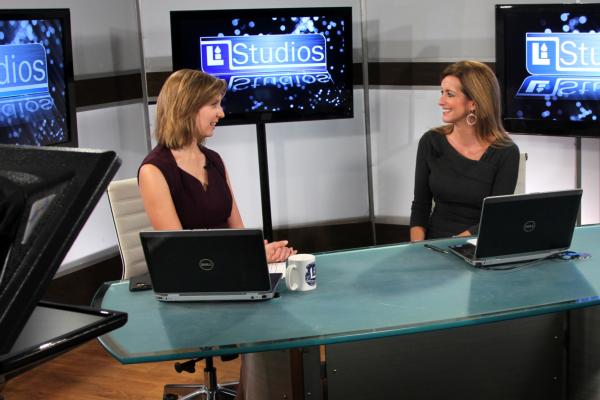
Kyle Baccei
November 24, 2015
The Science of Fascination
Last Wednesday the Leadership Institute hosted its biweekly webinar and the topic was fascinating. Peggy Grande visited LI studios to discuss the science of fascination during the free live webinar Lead, Live, and Be Fascinating.Peggy had the opportunity to work with one of the most fascinating individuals in history -- Ronald Reagan. She began the webinar discussing how her work with Reagan shaped her perspective on the science of fascination. What made him uniquely fascinating and why are we still analyzing his life and leadership? What can we learn from his life that we can apply to our own?Peggy answered these questions and offered insight into this iconic leader. She told us about the secrets to his effectiveness. How the life and presidency of Ronald Reagan can guide you and I toward greater personal success and shapes us professionally to be our best self.President Reagan was truly a fascinating man, and the lessons you and I can learn from his unique personality certainly make us better people.But still, I wondered, what makes me the most fascinating person? Sure, Ronald Reagan was fascinating and how he used his natural qualities to his advantage was great. But, how do I do this? What makes me different and how do they make me the most valuable to others? Peggy had the answer. Whether you are looking for a new job, moving up in your current career, or changing careers, it is essential to know how you uniquelyadd value. Trying to be “better” or “more” rarely works because it is subjective and constantly changing. Instead, she suggests you find out what makes you different and then you should become more of that. This was truly a fascinating webinar. Learning what makes each of us different, and then using that as an advantage, makes us unique in the work place. To hear Peggy talk about the science of fascination click here. It will be fascinating, I promise.For more information on webinars email Carol@LeadershipInstitute, or check out LI's training calendar to find the next live webinar.The Leadership Institute offers over 44 types of training programs, working with more than 1,582 conservative student groups, and helping employers connect with conservative jobseekers. Since the Institute's 1979 founding, LI has trained more than 170,116 conservative activists, students, and leaders. Graduates include members of Congress, state legislators, local officials, media personalities, and conservative organization leaders. For more information, please visit: www.LeadershipInstitute.org.>
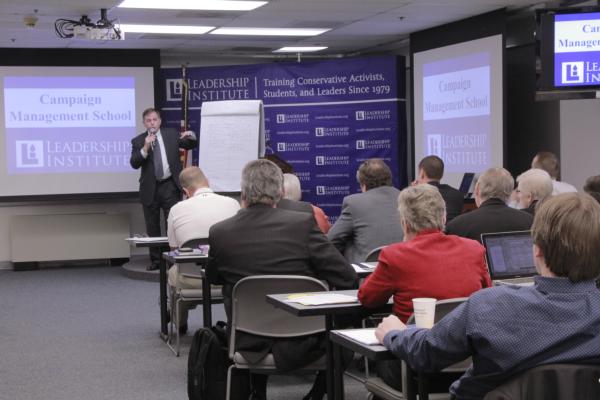
Thomas Bingham and Angel Chitnatham
November 19, 2015
Launch into 2016 as a Campaign Manager
This has been another good year for conservatives who took Leadership Institute (LI) training. In 2015 alone, 161 conservative activists took a Campaign Management School. These graduates are people looking to get involved in their community. They want to be leaders and make changes to their cities, counties, and states by winning elections -- for conservative principles.After hours of lectures, these graduates left with the ability to organize a campaign -- from the moment the campaign begins to Election Day. Better yet, LI grads learned what they have to do from day one to win and affect the public policy process.“I will be forever grateful for the knowledge and specialized training I have received at the Leadership Institute. LI is at the forefront of the current conservative revolution and I am proud to be a part of it,” said Florida resident James White, a recent Campaign Management School graduate.Tori Whiting of Michigan said the March training was “a great way to get conclusive and in-depth training on campaigning.” Ron Ferguson of Ohio said his June participation in LI's Campaign Management School was “the launching pad to being prepared for a campaign."These graduates understand in order to win being trained by the experts is the key to success. But 2015 isn't over yet. There is one last chance to attend a Campaign Management school in 2015.There is still time to join these graduates and get prepared for your next campaign.Mistakes happen, but Leadership Institute graduates know how to respond because they have training. They know how to have an effective strategy. The Campaign Management School teaches just that. And regardless of your political experience, the expert faculty will get you ready for day one of your next campaign.Each training day brings on a new lesson plan that will equip you with the basics to achieve success.Day 1: “Develop a winning campaign plan and strategy”Day 2: “Target and identify your voters effectively”Day 3: “Learn how to raise funds for your cause” Day 4: “Develop effective ads and protect your candidate's image”Join LI next month at the Campaign Management School, December 1st through December 4th and learn how to run your own campaign big or small. End the 2015 season with some inspiration and the know-how to take your race to the next level.Email Angel at AChitnatham@Leadeshipinstitute.org for more information on the training or register for the December Campaign Management School here.The Leadership Institute offers over 44 types of training programs, working with more than 1,582 conservative student groups, and helping employers connect with conservative jobseekers. Since the Institute's 1979 founding, LI has trained more than 165,206 conservative activists, students, and leaders. Graduates include members of Congress, state legislators, local officials, media personalities, and conservative organization leaders. For more information, please visit: www.LeadershipInstitute.org.>
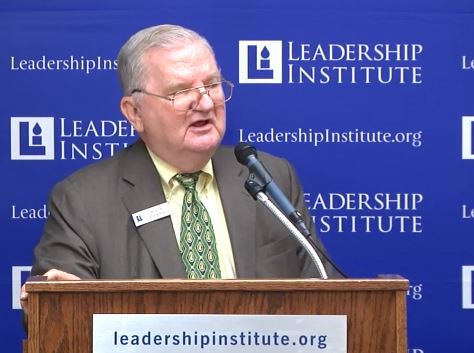
Kyle Baccei
November 5, 2014
When campaigns are prepared, good things happen
Prepared candidates do not panic. They have a plan. The Leadership Institute (LI) identifies, trains, and places conservatives who are prepared, and they win races. Many won in 2014 alone.“I am so proud of the work Morton Blackwell has done over the past fifty years to build a winning conservative movement,” said David Fenner, Vice President of Programs at the Leadership Institute. “Last night, Leadership Institute trained candidates, staff, and volunteers worked hard and smart in local, state, and federal campaigns in all fifty states. Despite staying up most of the night, Morton gave the following remarks to at our 8:00 a.m. Wednesday Wakeup Club Breakfast this morning.” "The most appropriate thing for me to say this morning is thank you to the donors of the Leadership Institute, because the good that you enable us to do has a long-term impact," said Morton Blackwell, President of the Leadership Institute.Join me in congratulating all of the Leadership Institute graduates who ran in, worked on, and volunteered on campaigns.>
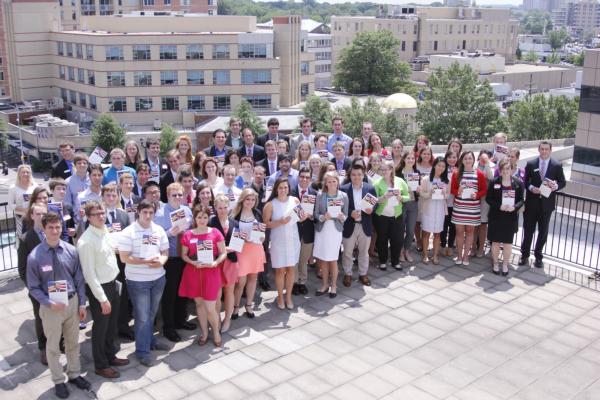
Ali Kudlick
June 30, 2014
DC Summer Interns Get Trained
Last week 84 conservative DC summer interns gathered at the Leadership Institute to learn the secrets for a successful internship.Experts on everything from networking and résumé writing to dressing for success addressed interns and provided tricks of the trade and personal experiences.Steve Sutton, vice president of Development at the Leadership Institute, began the training by advising interns to develop the “Four P's of Excellence: philosophical, political, professional and personal.”Knowing what you believe in is good, but it isn't sufficient. “You owe it to your philosophy to know how to win,” said Steve, famously quoting Morton Blackwell, LI's president. The rest of the day was dedicated to learning how to win through professional and personal excellence.Vice President for Strategic Communication at Wise Public Affairs Laura Rigas posed the question, “What does success look like?” She gave practical advice on knowing your leadership style, developing personal mission statements and defining your personal brand. She emphasized self-awareness in combination with specific measurable goals.“I feel equipped and better prepared to excel in Washington this summer and in the future,” said Austin Pendergist, intern in the office of Congressman Mark Sanford (R – SC).Interns from across the city had the chance to not only listen, but also to ask questions of the speakers as well as a panel of recruiters who work for political organizations around town. “Opportunities fall into your lap sometimes and you have to be ready for them,” said Lauren Wills, scheduler and intern coordinator for Congressman Thomas Massie (R – KY).“LI's Conservative Intern Workshop was a practical how-to guide for every conservative intern in Washington,” said Elizabeth Green, who is interning at the Franklin Center for Government and Public Integrity.>
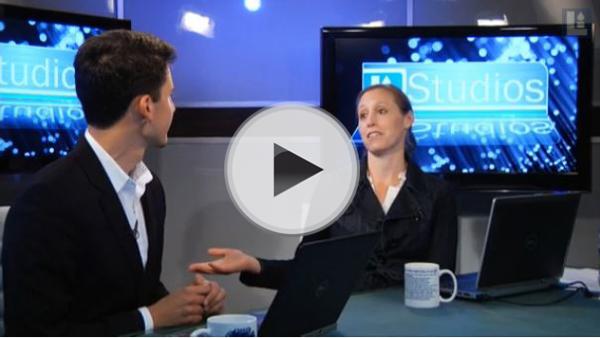
Carol Wehe
May 8, 2014
Breaking Records & Boundaries to Take LI Training to Your Living Room
The Leadership Institute broke the all-time webinar training record for live attendees during the April 25 webinar Growing Your Digital Reach featuring lecturer Ericka Andersen, The Heritage Foundation's digital media manager. One hundred eighty-one conservatives watched this live lecture online to learn how The Heritage Foundation connects with so many people, and how other conservative groups can grow their digital reach through email lists, multiple social media platforms, friends, allies, and giving back online.Click the picture to the left to hear The Heritage Foundation's Digital Media Manager Ericka Andersen speak about growing your digital reach.Twitter Abuzz About #LIwebinarSome attendees took to Twitter to live tweet Ericka's lecture. The Franklin Center of Government & Public Integrity's Outreach Manager Chris McCoy (@ChrisYMcCoy) tweeted one point she learned, “DON'T automate! Don't hook the same exact messaging to FB Twitter Instagram etc #LiWebinar Be Real.”America's Future Foundation (@AFF) told their followers to watch: “Happy Friday! Want to learn the secrets of growing your digital reach? Join @LeadershipInst today for a free webinar!"Karin Davenport also thanked LI saying, “Thx for the @LeadershipInst webinar today! As Comm Dir. of @USEnglishInc, it gave us lots of great new ideas!”Tweeted from behind the scenes in the control room at LI Studios, this picture to the right shows Ericka Andersen wrapping up her popular lecture on growing your digital reach, and Paulo Sibaja reading through the many attendee questions on twitter and email.Video LibrarySince 2011, the Leadership Institute has trained 3,450 attendees through free live webinars online, taking training to conservatives everywhere, from their living rooms to their offices, and with their local campaigns and tea party groups. After airing live, LI archives webinars and makes them available through the Leadership Institute's Online Video Library. Click below to see the archive of LI's recorded webinars.Watch the Leadership Institute's archive of recorded webinar trainings in any of these categories – Activism, Campaign, Campus, Career, Communications, Fundraising, and New Media. These webinars are free thanks to LI's generous donors and faculty, who give their money and time to make LI training possible. Generous Leadership Institute donors make webinars available at no cost to activists because they believe in training the next generation of conservative leaders. LI's speakers, experts in their respective fields, generously volunteer their time and expertise because they, like the Institute, want to increase the number and effectiveness of conservative activists in the public policy process. As LI President Morton Blackwell says, “Political technology determines political success.” >

Mike Rothfeld
October 1, 2013
Leadership Memo: No, you may not just quit
Rather than a piece by me to begin this Leadership Memo, I've decided to run a “guest editorial” by my friend and fellow Leadership Institute Board member Mike Rothfeld.Mike took LI training 28 years ago and has had a successful career as a political activist, a campaign consultant, a direct marketing consultant, and a conservative organizational entrepreneur. He frequently serves as a volunteer faculty member at Leadership Institute training schools and runs good training schools through one of his own, separate organizations, Foundation for Applied Conservative Leadership. He sent the below piece as an email to graduates of his own training, and I believe all principled LI graduates would benefit from reading his advice. Cordially,Morton BlackwellNo, you may not just quitBy Mike RothfeldThis email is only for folks who are in a position of leadership and/or responsibility, or intend to be in such a position one day. If you are not in either group, you may stop reading ... and ask yourself why you are on this list. Now, before I go further, I want to make something clear: The title does not apply to you if you are quitting because of a serious health issue, a crisis within your family or to maintain those who depend upon you financially. Your health, family and finances come before activism. This is not only proper, it is prudent. Activists who fail to keep their priorities straight destroy themselves or their family, or burnout, or all three. With that out of the way, let me re-state the title -- NO, YOU MAY NOT JUST QUIT. It does not matter that folks were mean to you (e.g. 2012 RNC Convention from beginning to end), cheated at the meeting (e.g. RNC Convention on the floor over Rules, Credentials and Roll Call), beat you in an unfair fight (e.g. 2012 RNC Convention in Credentials Committee), beat you in a fair fight (e.g. RNC Convention in Rules Committee [not counting the bus hijacking]) or ... anything. I do not care. People Look to You for HopeThere is no way around the fact that trying to defend and restore liberty and life is slow, hard and all-too-often heartbreaking work. You often will lose, fairly and unfairly. Even when you win, it often will seem pyrrhic or incomplete. And there is always another fight, another project and another assault to be handled. And so when you feel that powerful desire to chuck it all (and you WILL, probably over-and-over -- I sure have, as has virtually every one of my peers), consider how those around you probably feel. And they probably do not have your passion, vision, determination or training. If you quit, most of them will too. And if you quit from a position of responsibility or leadership that they promoted or supported you for, you will add treachery to your achievements. And You Don't Get to Reject Your Training EitherNow, in the dark times, even if you will not quit, you will face another, similar, temptation -- to switch trains. You know your training, and why you are doing what you are doing. You know why you should not waste time with 3rd parties, initiative and referenda, toothless resolutions and fantastical fix-it-all-in-one-move schemes (like a Limited Constitutional Convention). But suddenly, when the hard, correct path looms thick with obstacles and enemies, these softer, sillier approaches will lure you again. And they will sweeten their poison with this whisper "you are not quitting or selling out, you are just changing trains." And it is a lie. You are quitting. So What Do I Do When it Just Feels Like Crap?I am not going to insult you by saying "suck it up." Mostly folks who never really have been tested spout that advice. It may work for a few people, and it may work for you sometimes. But I think it likely that, sooner or later, it will not be enough. So I will give you the best advice I have heard; advice I have taken a number of times. It comes from Dr. Tony Evans, a well-known and respected (and loud) evangelical preacher out of Dallas, Texas. Dr. Evans was addressing Christians who were called by God to a particular work and were doubting they were still called to it. Although Dr. Evans was teaching Christians doing explicitly Christian work, his advice is clear. Dr. Evans said, "Continue doing what you knew you were clearly called to do until God clearly calls you to do something else." This means you trudge forward in the work you are doing (and it may take every ounce of will to take each step for a long period of time), unless there is concrete proof you must do something else. And, most of the time, you will find that there is nothing else; the dark period fades and the clarity, hope and, yes, even joy that brought you into the fight returns. James 1, 2-4: My brethren, count it all joy when you fall into various trials, 3knowing that the testing of your faith produces patience. 4But let patience have its perfect work, that you may be perfect and complete, lacking nothing. Peace and ... Best regards, Mike RothfeldPresidentFoundation for Applied Conservative Leadership © 2013 All Rights Reserved, Reprinted by permission.101 Washington StreetFalmouth, VA 22405kks@training4liberty.org>

Kyle Baccei
September 30, 2013
6 takeaways from LI's High-Dollar Fundraising School (Day 1)
The first day of the Leadership Institute's Comprehensive Fundraising Training -- a week-long bootcamp in raising funds for campaigns and causes -- kicked off with a full day at the High-Dollar Fundraising School.If you couldn't make it, don't worry. Below are the key takeaways I learned from each speaker. More to come throughout the week.-----You can't thank your donors enough.Carsten Walter, Development Director of the Heritage Foundation, opened the training by answering the question: why do people give you money? He explained the keys of donor communication and the importance of saying thanks.Other key points:--> People give because of a cause. Ask donors about an issue and then about how passionate they are about that issue.--> Send a thank-you note to donors and thank them multiple times.--> After you thank you donors, let them know where their money went.-----The five elements of asking donors: simple, unexpected, concrete, creditable, and have emotion or stories.Ian Ivey, who works for the General Service Administration but has a long background in the conservative movement, taught attendees how to create a case for giving -- and how to make it stick.Other key points:--> Your goal is to persuade donors that what you are doing is valuable to them.--> A good "pitch" follows the same checklist: simple, unexpected, concrete, creditable, and have emotion or stories. -----Fundraising in-person or over the phone is your most cost-effective way to raise money.Nancy Bocskor, Founder of the Nancy Bocskor Company, explained to students how to raise money person-to-person, to know when to ask for money, and to know what to avoid.Other key points:--> When you're making an ask, you have 21 seconds to make your impression.--> The results of personal solicitation are immediate. Anytime you call someone rather then send them direct mail your response rate will go up five times.--> When you're asking for funds, you need to have a firm greeting, engage in small talk, make a good sales pitch, and then close the deal. -----One person can only meet so many people -- so it's important to raise money with tools like direct mail.John Davis is the Director of Donor Communications at the Leadership Institute. He talked about the benefits of having a high-dollar direct-mail fundraising program.Other key points:--> The response rate to your first letter will be around 2%. But that's alright. Your goal is to build a core group of donors.--> Don't worry about getting a "no."--> Build relationships with your donors. Make your communication as personal as you can. It's okay not to ask for money. -----Your fundraising campaign must have a mission statement that is short and to the point. It creates energy and urgency.Karla Bruno is the Director of Foundations and Corporate Relations at the Leadership Institute. She taught attendees how to use capital campaigns to help their organizations grow.Other key points:--> Capital campaigns can super-charge your fundraising program when they tap into urgency. A sense of urgency in politics is phenomenal.--> The Leadership Institute's expanded its Campus Leadership Program into new office space with multiple elements of a successful capital campaign: a clearly defined mission, a sense of urgency with a deadline for action, and a video appeal with endorsements from conservative movement leaders, including Grover Norquist and Governor Mike Pence. -----Don't treat your donors as if you're meeting them for the first time.Dick Patten, the CEO of Patten and Associates, explained to attendees how they could upgrade their donors.Other key points:--> Remember: working with your donors is about their needs and wants, not yours -- theirs. Provide engagement in all your communications with them.--> Ask your donors for their input on a report card. Look at what's been accomplished and what needs to be done.--> Create a strategic plan for upgrading donors with dates, actions, benchmarks, and goals.Kyle Baccei is the Communications Manager for the Leadership Institute. Follow him on Twitter (@KyleBaccei).>
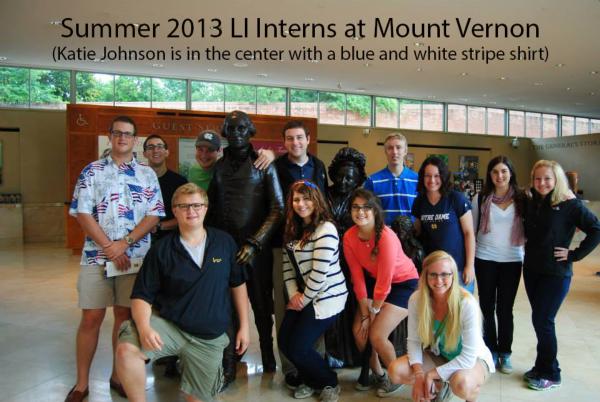
Katie Johnson
July 22, 2013
5 Things You Learn During Your First Few Weeks of a DC Internship
Intern season is here again in the DC metro area!During the summer students and young professionals from across the country and all over the world descend upon the District, a.k.a. Hollywood for political junkies, hoping to jump-start their careers.Thirteen lucky interns, me included, have the opportunity of a lifetime: interning with the Leadership Institute this summer!No matter what organization interns work for in the DC metro area, whether it be on the Hill, a non-profit, or a private company, interns are sure to learn a great deal during their time in the DC.Working at the Leadership Institute has been no exception. Below are some basic things I've learned during my first few weeks as an intern!.*Be prepared to fail, but learn your lesson and don't make the same mistake twice—Interns are new to the office. They can and will make mistakes. During one of my first weeks, my supervisor gave me directions on how to refill the coffee maker, which I completely forgot. Later a fountain of coffee came flowing out of the coffee pot and all over the kitchen counter. Always listen to your supervisors: the advice and directions they give are there for a reason.*Stay optimistic and have a can-do attitude— Sometimes you will be put in high-stress situations and will certainly be required to multitask and juggle directives from several different bosses and intern coordinators at once. Don't be afraid to lighten the situation with a joke or two (appropriate, of course). Always make the best of your situation and stay positive! Be willing to face challenges head on; don't complain, and your hard work will pay off in the end.*Social media: it's a blessing and a curse— Some jobs, including mine, require the use of social media. That's awesome! Young people today are all about Facebook, Twitter, and Instagram. However, you are still working so be sure to balance your social media usage with time delegated to other tasks. Prioritize—some tasks need to get done immediately, while others, such as a Facebook post or a tweet, can get done later, or can be scheduled ahead of time using awesome programs such as Hootsuite or Buffer.*Watch your spending – This applies to internships in any city, not just DC. When you're not working, you have a vast array of entertainment choices: events, concerts, restaurants, shopping, food trucks, museums, etc. However, city life is expensive! Know your limits when it comes to spending and also take advantage of discounts whenever possible. In DC there is always another happy hour, intern appreciation week, or free networking luncheon. Take full advantage of these free and inexpensive events and be smart with your finances.*Be Concise and Direct—Know what you want and ask for it in the shortest and most concise way possible. People are willing to help you if you ask for help, but you need to do it in a way that isn't verbose. This applies to everything from writing e-mails to co-workers to asking for an extended lunch so you can attend that policy briefing. Just remember to keep it simple. >